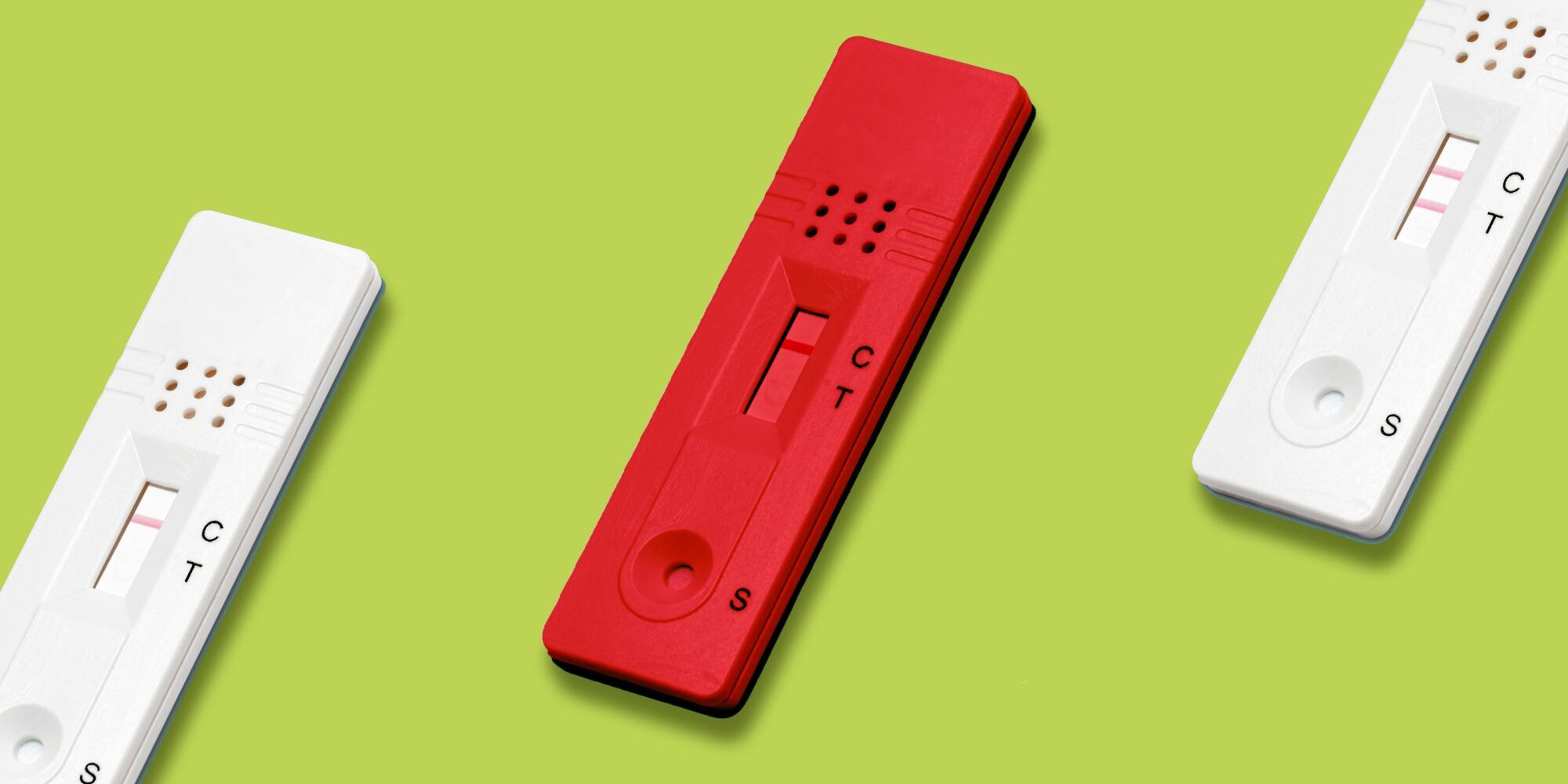

Omicron's swift rise in the US has led to a serious shortage of a pandemic necessity: at-home COVID-19 tests. And as people scramble to find some at their local pharmacies or online retailers, scammers have stepped up to the plate to sell their own unauthorized versions.
In a blog post shared on January 4, the Federal Trade Commission (FTC) warned that these fake at-home tests aren't only a waste of money, but they also "[increase] your risk of unknowingly spreading COVID-19 or not getting the appropriate treatment." The Food and Drug Administration (FDA) also sounded the alarm about fraudulent COVID-19 tests, along with other unauthorized products, including treatments, medical devices, or vaccines.
So how can you ensure the COVID test you have in your online shopping cart is a legitimate diagnostic tool and not an impostor? Here are four ways to confirm your at-home test's validity before making a purchase.
Make sure your test is authorized by the FDA
You'll want to check that the test is authorized for emergency use by the FDA—no exceptions.
That specific wording—"authorized" rather than "approved"—is important, Mara Aspinall, a professor of biomedical diagnostics at Arizona State University, tells Health. That's because COVID tests have only been given emergency use authorizations (EUAs), and if someone is trying to sell you a test that is "FDA-approved," it's a red flag.
"It is critical that people only use tests that are authorized in the United States," Aspinall says.
The FDA has two separate lists of tests given an EUA: One shows all the authorized antigen diagnostic tests, which are the ones most commonly used as at-home COVID tests. The other list shows all authorized molecular diagnostic tests, which are most commonly the polymerase chain reaction (PCR) tests administered by professionals (only a select few are authorized for home use).
The following antigen diagnostic tests are authorized for at-home use:
- BinaxNOW COVID-19 Ag Card Home Test
- BinaxNOW COVID-19 Antigen Self Test
- BinaxNOW COVID-19 Ag Card 2 Home Test
- COVID-19 At-Home Test by SD Biosensor, Inc.
- CLINITEST Rapid COVID-19 Antigen Self-Test
- iHealth COVID-19 Antigen Rapid Test
- CareStart COVID-19 Antigen Home Test
- BD Veritor At-Home COVID-19 Test
- SCoV-2 Ag Detect Rapid Self-Test by InBios International, Inc.
- InteliSwab COVID-19 Rapid Test
- Celltrion DiaTrust COVID-19 Ag Home Test
- QuickVue At-Home OTC COVID-19 Test
- Flowflex COVID-19 Antigen Home Test
- InteliSwab COVID-19 Rapid Test Rx
- QuickVue At-Home COVID-19 Test
- Ellume COVID-19 Home Test
The following molecular diagnostic tests are authorized for at-home use:
- Detect Covid-19 Test
- Lucira CHECK-IT COVID-19 Test Kit
- Cue COVID-19 Test for Home and Over The Counter Use
- Lucira COVID-19 All-In-One Test Kit
Pay for your test with a credit card
There are two ways scammers are preying on shoppers looking for COVID-19 at-home tests right now, Aspinall says: Some are taking orders for tests and sending nothing to the customers who have already paid them. Others are sending fake, faulty, or unauthorized tests to customers.
One way you can protect yourself while online shopping for tests is by paying for them with a credit card. "If you're charged for an order you never got, or for a product that's not as advertised, contact your credit card company and dispute the charge," the FTC says.
Buy from reputable retailers and websites
Treat your at-home COVID test like you would your prescriptions—that means buy them at the stores you use frequently, if you can. Aspinall suggests big-name stores—Walmart, Target, CVS, Amazon—are the safest options. This also ensures that your tests will still be within the expiration date (at-home tests have a shorter shelf life—some can expire in a few months). That also means you should be extremely skeptical of anyone selling at-home COVID tests on the street and avoid them, says Aspinall.
If you do end up purchasing tests from an unfamiliar website, you should do your homework before clicking the "buy" button. "Compare online reviews from a wide variety of websites, [and] think about the source of the review," the FTC says. In addition to checking out reviews, it might be worth Googling the name of the website next to words like "scam" and "complaint." This might pull up warnings from other online shoppers that can help inform your decision.
And if you were considering buying any at-home COVID tests from Facebook or Instagram marketplaces, you should probably reconsider. "In general, avoid buying off social media platforms," says Aspinall.
Check your boxes—and their contents
The box your COVID tests comes in should also tip you off to its legitimacy: All tests authorized by the FDA are labeled as such. Your box should also be sealed, without any signs of outside tampering.
What's inside the box matters too: According to Aspinall, most at-home COVID tests come with two tests per box. Meanwhile, if there's only one test, it will be packaged individually. If your test doesn't come with instructions, that could also be a red flag, indicating that the test was sold in a larger box—possibly one meant for professional use, which would mean a seller isn't legitimate, reports CBS News.
If you're still unsure about the legitimacy of any at-home COVID tests you previously bought, you can go ahead and order four free tests from the government—the Biden administration on Tuesday announced the launch of their COVIDTests.gov site, which allots four at-home COVID tests per household, shipped by the United States Postal Service.
Source: Read Full Article
